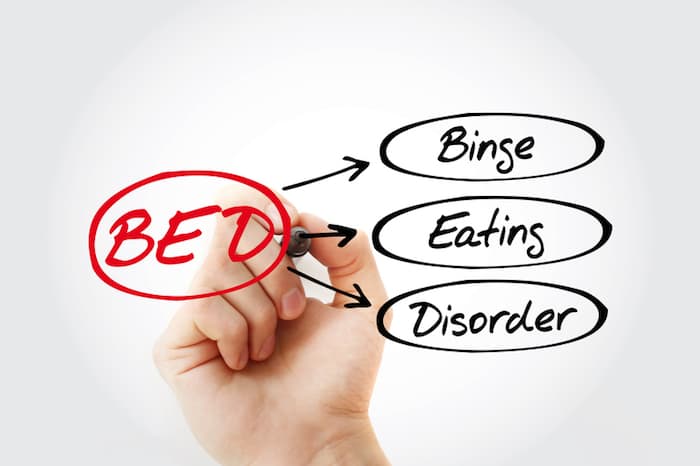- Calls to this hotline are currently being directed to Within Health, Fay or Eating Disorder Solutions
- Representatives are standing by 24/7 to help answer your questions
- All calls are confidential and HIPAA compliant
- There is no obligation or cost to call
- Eating Disorder Hope does not receive any commissions or fees dependent upon which provider you select
- Additional treatment providers are located on our directory or samhsa.gov
How to Find Binge Eating Disorder Treatment
Binge eating disorder (BED) is one of the most common eating disorders. A lot of attention is given to anorexia and bulimia, but BED is just as serious.
BED is an eating disorder characterized by recurrent episodes of binge eating. A binge is when someone eats an amount of food that most people wouldn’t eat in the same amount of time. A binge is more than overeating—it is a considerably large amount of food in one sitting.

This behavior is compulsive, which means that even if someone tries to avoid binge-eating they will find it near impossible to do so. BED is different from bulimia in that people dealing with BED don’t follow up their binging with compensatory behaviors such as purging or compulsive exercise.
Treatment is necessary for people with BED. Binge eating disorder recovery is possible and this article will go over how to discuss the need for treatment with loved ones and treatment options.
Get Treatment Online
How to Help Someone with Binge Eating Disorder
It can be overwhelming and stressful to see a loved one struggling with binge eating. On top of this, it can be even more difficult knowing how to talk about this with them and to assist them in getting a binge eating disorder help so that they can recover.
It is normal for people with eating disorders do not recognize right away that they have a problem. Even if it is obvious to others, the person struggling may be in denial.
You can still talk about it with them, though. One way to intervene is to express your concern. Avoid coming across as judgmental. You can say something like, “I found a pile of candy wrappers in the trash. It made me worried about you. Is something going on?” Another example of how to start a conversation is, “You’ve seemed more irritable and sad lately. I’m here if you want to talk.”
Expressing concern and inviting them to talk about it can open the door to more meaningful conversations. They might respond with anger, shock, or denial. This doesn’t mean the conversation wasn’t effective. It just means you’re planting a seed until they’re ready to talk about it.
If your loved one is an adult, there isn’t much more you can do besides express your concern and offer a helping hand. If your loved one is an adolescent and you aren’t their parents, you can still follow the examples above and try to talk about it with them. Consider telling their parents or another adult in their life who has the power to intervene and get them care.
Related Reading
If you are a parent of a child or teen who is struggling to overcome binge eating disorder, it’s important to talk with them about it. You can also consider taking them to a doctor, therapist, or dietitian who is educated about eating disorders.

How Can Binge Eating Disorder Be Treated
It is possible to treat binge eating disorders. While there aren’t any magic solutions, there are therapy techniques that research has found to be effective.
Eating disorder treatment may look a little different for everyone. Treatment should be tailored to the severity of the disorder. Each treatment is likely to include mental health counseling and support from a registered dietitian. These treatments can help someone find ways to stop the binge eating cycle.

Psychological Treatment for Binge Eating Disorder
As mentioned above, treatment for BED usually involves therapy with a mental health professional. Therapy can help someone understand what triggers the eating disorder behaviors and find coping skills to replace these behaviors.
For example, someone may discover that they binge after a stressful day at work. They may not be aware of this until a therapist helps them uncover this pattern. From there, therapy could focus on helping someone develop healthy ways to deal with stress.
Psychological treatment may also include meeting with a psychiatrist. It is very common for people with eating disorders to also struggle with other mental illnesses like anxiety or depression. Treating these conditions can make it easier to stop binging, as sometimes disordered eating behaviors are a way to cope with untreated mental health symptoms.
Speak With a Treatment Program
About Our Number
- Calls to this hotline are currently being directed to Within Health, Fay or Eating Disorder Solutions
- Representatives are standing by 24/7 to help answer your questions
- All calls are confidential and HIPAA compliant
- There is no obligation or cost to call
- Eating Disorder Hope does not receive any commissions or fees dependent upon which provider you select
- Additional treatment providers are located on our directory or samhsa.gov
How to Stop Binge Eating at Night
Night eating syndrome is sometimes confused with binge eating disorder. People with night eating syndrome may snack throughout the night, while people who struggle with binge eating eat a lot in one sitting.
Here are two tips to avoid binge eating at night:
- Make sure you eat enough at mealtimes. Sometimes people binge because they’re hungry from not eating enough. You can meet with a registered dietitian to get information about appropriate meal sizes so that you’re physically satisfied.
- Check in with Your Feelings. Sometimes binge eating can be a way to try to deal with emotional hunger. If you’re emotionally needing something, see if you can figure out what it is. Maybe you’re feeling lonely, sad, or worried. Coping with your feelings can take away the urge to soothe yourself through food.

Binge Eating Disorder Help Options
Binge eating disorder, just like other eating disorders, can have a negative impact on someone’s emotional and physical well-being. Getting care can help someone learn how to prevent binge eating and can help them develop healthier coping skills and a relationship with food.
If you are looking for treatment, it’s important to make sure the provider is qualified to treat you. Professionals, including doctors, who are eating disorder specialists have received extra training in how to diagnose and treat these conditions. You can ask them about their experience and what education they have.
Similarly, a treatment program should be accredited. Ask them who they are accredited by. Accreditation boards, such as JCAHO, set standards for programs. These standards help make sure that a program is safe and effective for clients.
Certain programs have virtual options which make it possible to get binge eating disorder treatment at home. This can be especially helpful for people who live in rural areas where it’s not realistic or feasible to get in-person treatment.
Binge Eating Disorder & Vyvanse Response to the Journal Sentinel Article
by Jacquelyn Ekern, MS, LPC. (May 23, 2016)
Author
Publish Date:
Last Updated:
Page Last Reviewed and Approved By: Jacquelyn Ekern, MS, LPC / 12.6.21

